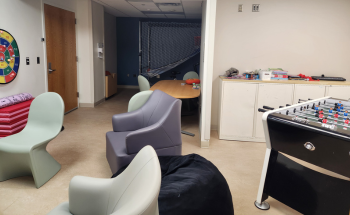
Duke child and adolescent psychiatry (CAP) fellows provide patient care in a variety of clinical settings to establish a solid foundation in core competencies. In addition to core clinical rotations, fellows can pursue specific clinical and academic interests in a range of specialty clinics.
At each clinical rotation, fellows receive close supervision and mentoring by experienced faculty members invested in their success. We are committed to serving patients from diverse backgrounds, addressing health disparities and social determinants of health, and increasing access to care.
Read on to learn more about how first- and second-year fellows spend their time in the program.
During the first year, CAP fellows gain experience in several diverse clinical settings, including a state psychiatric hospital, Duke University Hospital, psychotherapy training (family therapy and individual cognitive behavioral therapy), and exposures to various outpatient clinics. Each year is divided into eight blocks, which are six or seven weeks each.
Central Regional Hospital (Inpatient)
First-year CAP fellows rotate on child and adolescent units at Central Regional Hospital (CRH) in Butner, North Carolina. One of three state psychiatric inpatient facilities in the state, CRH serves a broad range of patients and their families from central and coastal North Carolina. At CRH, multidisciplinary teams comprising physicians, psychologists, social workers, nurses and behavioral specialists collaborate to treat children and adolescents.
First-year fellows spend roughly one-half of their time working with latency-age children and one-half working with adolescents. Trainees work with patients with autism spectrum disorder, gender dysphoria, early onset psychosis, complex chronic medical problems and complex psychosocial problems, as well as mood and behavioral disorders.
Fellows work at CRH part time for two blocks. A typical schedule is included below.
| Monday | Tuesday | Wednesday | Thursday | Friday | |
|---|---|---|---|---|---|
| AM | CRH | CRH | CRH | Academic Half Day | CRH |
| PM |
Psychosocial Treatment Clinic |
CRH | CRH | Family Studies Clinic | CRH |
Duke University Medical Center (Pediatric Psychiatry Consult-Liaison Team)
Fellows also spend time rotating on the pediatric psychiatry inpatient consultation-liaison (C/L) service at Duke Children’s Hospital. Fellows round with multidisciplinary teams including psychologists and social workers in intensive care units and pediatric floors, develop into team leaders, and teach medical students and residents. Over the course of the rotation, fellows develop expertise treating infant delirium, eating disorders and mood disorders, among other conditions.
Fellows work at on the C/L service part time for two blocks. A typical schedule is included below.
| Monday | Tuesday | Wednesday | Thursday | Friday | |
|---|---|---|---|---|---|
| AM | C/L | C/L | C/L | Academic Half Day | C/L |
| PM | Psychosocial Treatment Clinic | C/L | C/L | Family Studies Clinic | C/L |
Duke University Medical Center (Emergency Psychiatry)

Fellows gain experience in pediatric emergency and acute care psychiatry at Duke University Medical Center. Fellows evaluate and treat pediatric patients on the 5100 Behavioral Health Extension Unit under direct supervision of Child and Adolescent Psychiatry faculty. They collaborate with nursing, case management, and psychologists on patient evaluations, treatment planning and disposition decision. Fellows are involved of the care of patients experiencing mental or behavioral health crises, and enhance their skills in safety planning, short-term therapy, and psychopharmacology.
Fellows work on the 5100 Behavioral Health Extension Unit part-time for two blocks.
A typical schedule is included below.
| Monday | Tuesday | Wednesday | Thursday | Friday | |
|---|---|---|---|---|---|
| AM | 5100 Unit | 5100 Unit | 5100 Unit | Academic Half Day | 5100 Unit |
| PM | Psychosocial Treatment Clinic | 5100 Unit | 5100 Unit | Family Studies Clinic | 5100 Unit |
Duke University Medical Center (Ambulatory Experiences)
Fellows spend two blocks at various clinical sites that enhance their understanding of child development, psychopathology, and treatment in diverse settings. These include in pediatric neurology clinics (epilepsy, cerebral palsy, and sleep disorders), autoimmune brain disorders clinic, outpatient psychopharmacology clinics, developmental-behavioral pediatrics clinic, and exposure to our collaborative care program. Fellows also rotate at a residential treatment center for a half-day per week.
The Ambulatory experience also includes up to one day per week of protected time for scholarship or research projects. Fellows continue to see their psychotherapy patients as well.
Outpatient Psychotherapy Clinics
Fellows develop psychotherapy skills in two outpatient clinics, the Psychosocial Treatment Clinic and the Family Studies Program.
The Psychosocial Treatment Clinic is a cognitive-behavioral therapy based clinic for children and adolescents with a variety of conditions. Fellows develop competency in both short- and long-term evidence-based psychotherapy with close supervision from teaching faculty. This rotation occurs weekly for 12 months.
The Duke Family Studies Program and Clinic, an innovative training model that incorporates live-observed supervision facilitated by a two-way mirror and computer console feed. With teams of learners and weekly systems-based didactics, trainees acquire invaluable techniques and perspective on family system dynamics and pathology. This rotation occurs weekly for 12 months.
An example yearly schedule for a first-year fellow may be organized as follows:
| Block | Length | Name |
|---|---|---|
| 1 | 6 weeks | Consult-Liaison |
| 2 | 7 weeks | 5100 Behavioral Health Extension Unit |
| 3 | 6 weeks | Central Regional Hospital |
| 4 | 7 weeks | Ambulatory Block |
| 5 | 6 weeks | Consult-Liaison |
| 6 | 6 weeks | 5100 Behavioral Health Extension Unit |
| 7 | 7 weeks | Central Regional Hospital |
| 8 | 7 weeks | Ambulatory Block |
Second-year CAP fellows devote their time to outpatient child psychiatry. Fellows benefit from core clinical experiences at the Lakeview Child and Family Clinic, Duke Autism Clinic, school based mental health (COPE program), observation in a pre-school setting, and continue their psychotherapy training for at least ½ day per week.
Our program offers numerous elective opportunities that facilitate in-depth learning and give fellows the freedom to explore interests and develop expertise. In addition to the training experiences offered at the sites below, past fellows have pursued advanced psychotherapy training in Trauma Focused CBT, individual and family based treatment of eating disorders, and Parent Management Training. Fellows can also bolster their skills as clinician educators via advanced training and mentorship. Finally, many fellows dedicate time to pursuing research projects via a mentored research elective.
A sample second year fellow schedule is included below, illustrating the amount of flexibility we ensure fellows have to pursue their individual interests:
|
|
MONDAY | TUESDAY | WEDNESDAY | THURSDAY | FRIDAY |
|---|---|---|---|---|---|
| AM |
Research vs. Elective |
Research vs. Elective |
COPE Program Preschool Observation Administrative |
Academic Half Day | Autism Clinic |
| PM | Psychosocial Treatment Clinic | Lakeview Child and Family Clinic | Psychopharmacology Clinic | Chief Fellow Administrative Time | Elective |
Learn more about core and elective Duke training sites.
- Center for Child and Family Health
- Central Regional Hospital
- Child Trauma
- Duke ADHD Clinic
- Duke Autoimmune Brain Disorders Clinic
- Duke Center for Adolescent and Young Adult Substance Use Treatment
- Duke Center for Autism and Brain Development
- Duke Child and Adolescent Gender Care Clinic
- Duke Children's Evaluation Center
- Duke Children’s Hospital
- Duke Eating Disorders Clinic
- Duke Family Studies Program and Clinic
- Pediatric Neuropsychology Program
There is no in-house overnight call. CAP fellows provide weekend daytime coverage at the Duke University Hospital System pediatric psychiatry consult-liaison and emergency department with direct supervision from a core faculty member for 6-7 weekends per year (including holidays). Fellows also provide phone coverage for two pagers (urgent concerns from the pediatric C/L team and clinic outpatients who have urgent concerns).